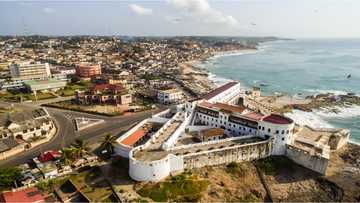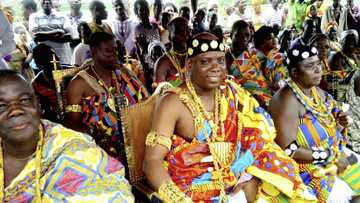Basic elements of culture in Ghana
Ghana, also translated as ever so mightily ‘Warrior King’ is a west African country sitting on the coast of the Atlantic Ocean. A versatile nation with a population of 25 million people, it boasts of a diversity of over a hundred ethnic groups. As one of the elements of culture, and like the rest of the former British colonies, Ghana widely uses the English language as their national language. The people of Ghana are a pleasant and friendly people. They tend to take life at a slower pace with human relations being given equal consideration to ‘business relations. The society in Ghana is generally hierarchical. Senior people and older people are culturally given more respect in the Ghanaian community. A list of elements of culture will reveal the beautifully diverse and rich Ghana culture and customs that are portrayed in the basic elements of Ghanaian culture.

Language
The over a hundred languages spoken in Ghana but only nine of the are government sponserd. The include, Akan, Dagbani, Ewe, Ga, Dangme, Dagaare, Nzeema, Kasem, Gonja, and Twi. Language in Ghana is used widely by incorporating local dialects to the common national language of English. It is also important to note that Ghana has a large Muslim community that uses Hausa language as their lingua Franca. Like most countries on Africa, the bigger tribes due to their large numbers, have more influence as well in the usage of their local dialects. Akan, Wale, Dogba as well as Fante and Twi are some of the most widely spoken local languages in Ghana.
Artifacts
One thing that you will notice with Ghanaians is the vibrancy of the color generally across the nation. Ghana has some of the best fabrics with bold patterns and millions of different styles to choose from. Starting with their regular regalia to the more sophisticated ceremonial looks, you will not lack some stunning beauty with the material elements of the culture in Ghana. The country is producing not just one type, but three types of solely African fabrics. These include the batik, wax cloth as well as the Kente fabric. Even though they use traditional methods of production, the industry is gaining great popularity as well in the modern trends. This places Ghana at a position of great advantage as this is a big part of Ghana's material elements of culture.
A stool is among Ghana's most valued material components of culture since it symbolizes power. To be on the stool means to be in power and vice versa. You will find this symbolism etched on traditional houses, traditional fabrics and is nationally acclaimed as the symbol of leadership. The importance is derived from the Golden stool, which to the Ashanti it is the royal throne. The Ghanaian flag has the colors red signifying the blood shed in the struggle for independence, green stripes representing the rich greenery of Ghana and gold to show the wealth of minerals in the country. It also has a five pointed star that represents African freedom.

Norms and traditions
Besides the elements of material culture, Ghanaians have an array of traditions and norms. This is attributed by the different tribes, each with its own different views and cultures. The values held by the people of Ghana are of respect for elders and respect for one another. It is considered rude for gesturing using the left hand especially to people older than you.
Generosity is also part and parcel of Ghana customs. There is a great sense of community among the Ghanaians and work is shared. For example, in the households, and this also goes down to general kindness and the heart go share. Culture in Ghana is held at high regard even in spite of the ethnic barriers. Among the Ghanaian people, decorum and dignity among all members of community is held with a lot of importance.
The tribes in Ghana also respects natural resources, especially forests, ad water bodies. Communities at the coast have forbidden fishing on Tuesdays since to them the sea is goddess that they worship. They believe that on Tuesdays, the goddess spends time with her children which are the fishes.
Symbols and gestures
Ghana is not to be forgotten in matters of symbols and gestures. Ghanaian culture being so rich is as expected full of many traditions and a newcomer might take a while to be versed with the Ghanaian culture and traditions in matters of symbolism and gestures. To begin with some interesting symbols, you might find some Ghanaian women carrying dolls. These are known as fertility dolls and they show that the woman carrying the doll is trying to conceive. As mentioned earlier, the left hand is considered a ‘dirty hand’ and to extend one in greeting is considered highly offensive.
In Ghana, you also find that hand-holding is a common symbol. It signifies friendship among people. It is however not common to find opposite sexes holding hands because as per the culture in Ghana it is generally frowned upon to display affection publicly with a lover. Hand-holding even among two men is simply a friendly gesture.
Wiggling the middle fingers in a handshake is also a profound sign in the Ghana culture and traditions. This sign means that the two people love one another. Again it does not necessarily mean in a Romantic manner but more in a friendly perspective. Handshakes sometimes involve the middle finger wiggling then followed by a snap of the fingers. This is always an ice breaker and a sign of ease and friendship on what is the culture of Ghana.
READ ALSO: 10 ridiculous African cultural excuses that must end

Dating
Ghanaian dating culture and Ghanaian culture marriage is a serious and well orchestrated affair. However with modernization, many more informal marriages are taking place. Courtship in Ghanaian culture is done in a traditional way. I’m some communities, it is traditional to take to the bride a gift of a sewing machine in case she will need to earn extra income. It is also customary for some grooms to take some cloth and a headscarf for the brides mother and sandals for her father. This is all symbolic to the grooms family and shows responsibility and willingness to marry their daughter. These elements of material culture just culminate to show the importance with which marriage is taken in Ghana.
Marriage ceremonies
Traditional marriage among the Akan community is a family affair. Both sides of the family will usually take part in the ceremony and come together to celebrate the union. The bride and groom usually show up in beautifully tailored Kente in their preferred style and color. Marriage ceremonies in Ghana are a very jovial affair involving a lot of singing and dancing.
In modern Ghanaian culture and traditions however, you find that western styles of marriage are incorporated into the traditional marriage. It is not surprising to find the traditional marriage being called engagement. They are however very legitimate and the couple can go and have it officially registered.
It is customary in Ghanaian culture marriage to bring several gifts and to also pay dowry, otherwise known as bride price. Failure to pay these can lead to a wedding declination as it shows the man might not be able to provide for his new bride. This payment of dowry can be a very costly affair is yet another proof of wealth of material element of culture among the people of Ghana.

Religion
What is the culture in Ghana regarding matters of worship? From the 2010 census, you will find that a whooping 71.2 percent of Ghanaians are Christians. There is a mix of Pentecostal, Protestant As well as catholic Christians across Ghana. Another predominant religion in Ghana are the Hausa speaking Muslims that make up 17.6% of the population. With the spirit of tolerance cultivated among the people of the former Ivory Coast, the two dominant religions generally coexist in harmony with one another. The traditional religion is still practiced by at least 5.2% of the people of Ghana. There are however no updated figures on statistics of religion in Ghana, but based on Vanderbilt University, in 2012, Christianity stood at 74.1% while Muslims stood at 17.5% of the population.
With an abundance of dialects and ethnicities you find that traditional worship is highly varied and original to the specific groups. So to say, Ghana history and culture of religion is rich and varied even with a majority of Christians.
Work ethic
The work ethic and working culture of the Ghanaians is more slow paced, compared to the western work ethic. People in Ghana are very hard working but they believe in striking a balance. A study of the Akan people who do fishing and agriculture shows that they work on all days except the days considered holy. They have an array of agrarian and fishing festivals. They use their traditional methods to decipher which fish to take and which plants and animals to protect. This method in Ghana history and culture helps in protecting the balance and harmony of man and nature. This will prevent overfishing and destruction of land to ensure there’s enough productivity to keep the people fed.
This is seen in Ghana on a larger scale. Harmony and interpersonal relationships are still considered important in the modern work place. Modern methods continue however to be adapted in the different industries that are found in Ghana.

Ghana culture facts
- Ghana produces a unique cotton cloth called kente
- Ghanaians learn religious and cultural tolerance from a young age
- Ghana has more than a hundred local dialects
- Ghana is the largest exporter of cocoa beans in Africa
- In Ghana, you do not eat until the eldest male does
- Polygamy is legal in Ghana
- Seasons are accompanied by ceremonies
READ ALSO: Positive and negative cultural practices in Ghana
Source: YEN.com.gh








